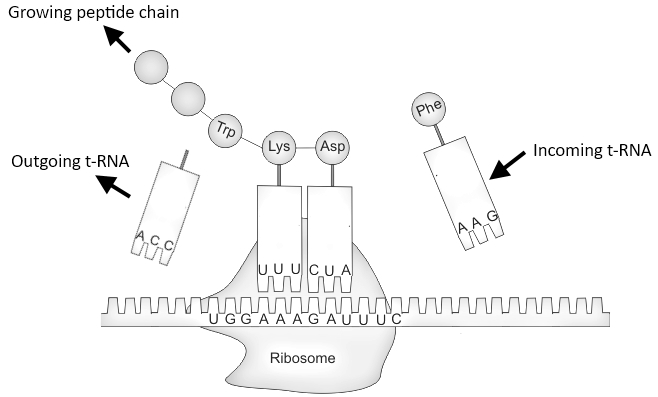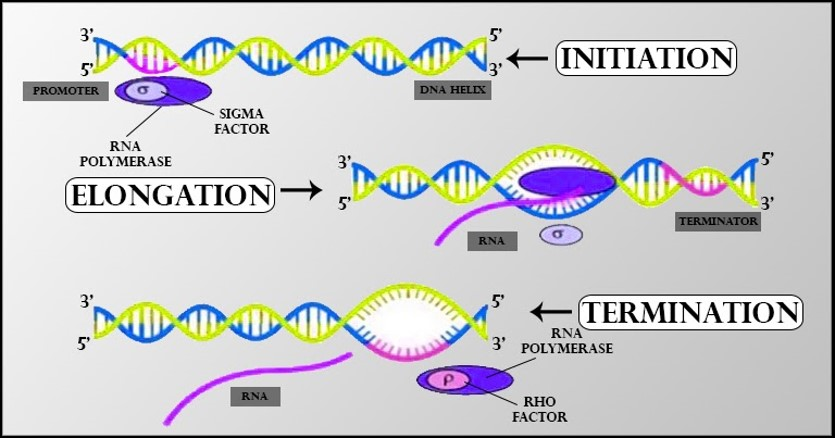
The most important function of mRNA is to
(a)Provide specific binding sites for a series of specific tRNA molecules
(b)Hold a group of ribosome together
(c) Transfer the genetic code to ribosomal RNA
(d) Transfer the genetic code to DNA.
Answer
586.8k+ views
Hint: A type of RNA that plays a vital role in protein synthesis. It is a single-stranded RNA molecule that is complementary to one of the DNA strands of a gene but contains uracil in place of thymine.
Complete answer:
Messenger RNA (mRNA) carries the genetic code from DNA in a form that will recognize proteins. The coding sequence of the mRNA determines amino acid sequences in the protein produced.
Additional Information: Major types of RNA and their functions:
There are mainly 3 types of RNA.
-mRNA-Messenger RNA: which encodes amino acid sequences of a polypeptide.
-tRNA-Transfer RNA: Brings amino acids to ribosomes during the process called Translation.
-rRNA-Ribosomal RNA: With ribosomal proteins, makes up the ribosomes and the organelles that will translate the mRNA.
Protein synthesis occurs in the cytoplasm of the cell on ribonucleic particles, the ribosomes.
Protein synthesis:
Protein synthesis is the process by which cells synthesize protein.
The two stages involved in protein synthesis are Transcription and Translation.
There are 5 major steps for protein synthesis:
1)Activation of amino acids.
2)Transfer of amino acid to tRNA.
3)Initiation of the polypeptide chain
4)Chain Termination.
5)Protein Translocation.

So, the correct answer is ‘Transfer the genetic code to ribosomal RNA’.
Note: The structure and function of mRNA are:

Complete answer:
Messenger RNA (mRNA) carries the genetic code from DNA in a form that will recognize proteins. The coding sequence of the mRNA determines amino acid sequences in the protein produced.
Additional Information: Major types of RNA and their functions:
There are mainly 3 types of RNA.
-mRNA-Messenger RNA: which encodes amino acid sequences of a polypeptide.
-tRNA-Transfer RNA: Brings amino acids to ribosomes during the process called Translation.
-rRNA-Ribosomal RNA: With ribosomal proteins, makes up the ribosomes and the organelles that will translate the mRNA.
Protein synthesis occurs in the cytoplasm of the cell on ribonucleic particles, the ribosomes.
Protein synthesis:
Protein synthesis is the process by which cells synthesize protein.
The two stages involved in protein synthesis are Transcription and Translation.
There are 5 major steps for protein synthesis:
1)Activation of amino acids.
2)Transfer of amino acid to tRNA.
3)Initiation of the polypeptide chain
4)Chain Termination.
5)Protein Translocation.

So, the correct answer is ‘Transfer the genetic code to ribosomal RNA’.
Note: The structure and function of mRNA are:
| Structure | Short, unstable, single-stranded RNA which corresponds to a gene encoded within DNA. |
| Function | It serves as an intermediary between the DNA and protein; used by the ribosome to direct synthesis of protein it encodes in. |

Recently Updated Pages
Basicity of sulphurous acid and sulphuric acid are

Master Class 12 English: Engaging Questions & Answers for Success

Master Class 12 Social Science: Engaging Questions & Answers for Success

Master Class 12 Maths: Engaging Questions & Answers for Success

Master Class 12 Economics: Engaging Questions & Answers for Success

Master Class 12 Physics: Engaging Questions & Answers for Success

Trending doubts
Draw a labelled sketch of the human eye class 12 physics CBSE

Which are the Top 10 Largest Countries of the World?

Draw ray diagrams each showing i myopic eye and ii class 12 physics CBSE

Giving reasons state the signs positive or negative class 12 physics CBSE

Explain esterification reaction with the help of a class 12 chemistry CBSE

What is defined as a solenoid Depict a diagram with class 12 physics CBSE




